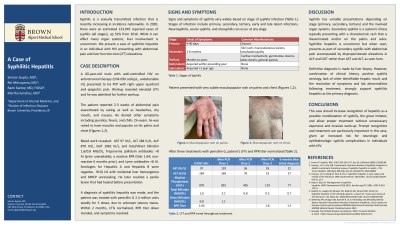Back


Poster Session B - Monday Morning
Category: Liver
B0591 - A Case of Syphilitic Hepatitis
Monday, October 24, 2022
10:00 AM – 12:00 PM ET
Location: Crown Ballroom

Has Audio

Simran Gupta, MD
Brown University
Providence, RI
Presenting Author(s)
Simran Gupta, MD, Rei Mitsuyama, MD, Rami Kantor, MD, Martha Sanchez, MD
Brown University, Providence, RI
Introduction: Syphilis is a sexually transmitted infection that is recently increasing nationwide. While it can affect many organ systems, liver involvement is uncommon. We present a case of syphilitic hepatitis in an individual with HIV presenting with abdominal pain and LFT elevations.
Case Description/Methods: A 60-year-old male with well-controlled HIV on HAART (CD4 699, undetectable VL) presented to his PCP with right upper quadrant and epigastric pain. Workup revealed elevated LFTs and he was admitted for further workup.
The patient reported 2-3 weeks of abdominal pain exacerbated by eating as well as headaches, dry mouth, and nausea. He recalled a penile lesion that had healed before presentation and denied other symptoms including jaundice, fevers, and chills. On exam, he was noted to have macules and papules on his palms and chest.
LFTs demonstrated AST 97, ALT 284, ALP 870, GGT 1062, and total/direct bilirubin 1.6/0.8. Other labs revealed treponema pallidum antibodies >8 (prior unavailable), a reactive RPR (titer 1:64; non-reactive 6 months prior), and lyme antibodies >8. Additionally, HAV IgM Ab, HBV SAg, HBV Core IgM Ab were non-reactive, RUQ US with incidental liver hemangioma and MRCP unrevealing. A diagnosis of syphilitic hepatitis was made and the patient was treated with penicillin G 2.4 million units weekly for 3 doses, due to unknown latency status. Within 2 months, LFTs normalized and symptoms resolved.
Discussion: Syphilis has variable presentations depending on stage (primary, secondary, tertiary) and the involved organ systems. Secondary syphilis is a systemic illness typically presenting with a characteristic rash that is disseminated and/or on the palms and soles. Syphilitic hepatitis is uncommon but when seen, presents as part of secondary syphilis with abdominal pain accompanied by disproportionate elevations in ALP and GGT rather than AST and ALT, as seen here.
Definitive diagnosis is made by liver biopsy. However, combination of positive syphilis serology, lack of other identifiable hepatic insult, and the resolution of symptoms and lab abnormalities following treatment, strongly support syphilitic hepatitis as the primary diagnosis.
This case should increase recognition of hepatitis as a possible manifestation of syphilis and allow proper treatment without unnecessary expensive and invasive work-up. Prompt recognition and treatment are particularly important in this case, given an increased risk for neurologic and ophthalmologic syphilis complications in individuals with HIV.
Disclosures:
Simran Gupta, MD, Rei Mitsuyama, MD, Rami Kantor, MD, Martha Sanchez, MD. B0591 - A Case of Syphilitic Hepatitis, ACG 2022 Annual Scientific Meeting Abstracts. Charlotte, NC: American College of Gastroenterology.
Brown University, Providence, RI
Introduction: Syphilis is a sexually transmitted infection that is recently increasing nationwide. While it can affect many organ systems, liver involvement is uncommon. We present a case of syphilitic hepatitis in an individual with HIV presenting with abdominal pain and LFT elevations.
Case Description/Methods: A 60-year-old male with well-controlled HIV on HAART (CD4 699, undetectable VL) presented to his PCP with right upper quadrant and epigastric pain. Workup revealed elevated LFTs and he was admitted for further workup.
The patient reported 2-3 weeks of abdominal pain exacerbated by eating as well as headaches, dry mouth, and nausea. He recalled a penile lesion that had healed before presentation and denied other symptoms including jaundice, fevers, and chills. On exam, he was noted to have macules and papules on his palms and chest.
LFTs demonstrated AST 97, ALT 284, ALP 870, GGT 1062, and total/direct bilirubin 1.6/0.8. Other labs revealed treponema pallidum antibodies >8 (prior unavailable), a reactive RPR (titer 1:64; non-reactive 6 months prior), and lyme antibodies >8. Additionally, HAV IgM Ab, HBV SAg, HBV Core IgM Ab were non-reactive, RUQ US with incidental liver hemangioma and MRCP unrevealing. A diagnosis of syphilitic hepatitis was made and the patient was treated with penicillin G 2.4 million units weekly for 3 doses, due to unknown latency status. Within 2 months, LFTs normalized and symptoms resolved.
Discussion: Syphilis has variable presentations depending on stage (primary, secondary, tertiary) and the involved organ systems. Secondary syphilis is a systemic illness typically presenting with a characteristic rash that is disseminated and/or on the palms and soles. Syphilitic hepatitis is uncommon but when seen, presents as part of secondary syphilis with abdominal pain accompanied by disproportionate elevations in ALP and GGT rather than AST and ALT, as seen here.
Definitive diagnosis is made by liver biopsy. However, combination of positive syphilis serology, lack of other identifiable hepatic insult, and the resolution of symptoms and lab abnormalities following treatment, strongly support syphilitic hepatitis as the primary diagnosis.
This case should increase recognition of hepatitis as a possible manifestation of syphilis and allow proper treatment without unnecessary expensive and invasive work-up. Prompt recognition and treatment are particularly important in this case, given an increased risk for neurologic and ophthalmologic syphilis complications in individuals with HIV.
Disclosures:
Simran Gupta indicated no relevant financial relationships.
Rei Mitsuyama indicated no relevant financial relationships.
Rami Kantor indicated no relevant financial relationships.
Martha Sanchez indicated no relevant financial relationships.
Simran Gupta, MD, Rei Mitsuyama, MD, Rami Kantor, MD, Martha Sanchez, MD. B0591 - A Case of Syphilitic Hepatitis, ACG 2022 Annual Scientific Meeting Abstracts. Charlotte, NC: American College of Gastroenterology.
